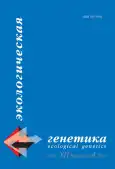Association of GSTM1 (del),GSTP1 (Ile105Val) genetic polymorphisms and smoking in the family with congenital malformations
- Authors: Shatalina I.V.1, Gareeva Y.V.2, Gordeeva L.A.1, Voronina E.N.3, Sutulina I.M.4, Filipenko M.L.3
-
Affiliations:
- Institute of Human Ecology of the Siberian Branch of the RAS
- M. A. Podgorbunskiy municipal clinical hospital N 3
- Institute of Chemical Biology and Fundamental Medicine SB RAS
- Kemerover State Medical Academy (KemSMA)
- Issue: Vol 12, No 4 (2014)
- Pages: 38-43
- Section: Articles
- URL: https://bakhtiniada.ru/ecolgenet/article/view/2489
- DOI: https://doi.org/10.17816/ecogen12438-43
- ID: 2489
Cite item
Full Text
Abstract
Keywords
Full Text
##article.viewOnOriginalSite##About the authors
Irina Viktorovna Shatalina
Institute of Human Ecology of the Siberian Branch of the RAS
Email: irina_ve@mail.ru
biological engineer. Lab. of immunogenetics
Yuliya Valerievna Gareeva
M. A. Podgorbunskiy municipal clinical hospital N 3
Email: gareeva.j@bk.ru
neonatologist
Lyudmila Aleksandrovna Gordeeva
Institute of Human Ecology of the Siberian Branch of the RAS
Email: gorsib@rambler.ru
candidate of biological sciences. Head of Laboratory immunogenetics
Elena Nikolaevna Voronina
Institute of Chemical Biology and Fundamental Medicine SB RAS
Email: voronina_l@inbox.ru
candidate of biological sciences, jounior researcher. Laboratory of pharmacogenomics
Irina Mikhaylovna Sutulina
Kemerover State Medical Academy (KemSMA)
Email: sutulinaim@rambler.ru
candidate of medical sciences. Dept. of Faculty Pediatrics
Maksim Leonidovich Filipenko
Institute of Chemical Biology and Fundamental Medicine SB RAS
Email: max@niboch.nsc.ru
candidate of biological sciences, Head of Laboratory pharmacogenomics
References
- Вавилин В. А., Часовникова О. Б, Ляхович В. В. с соавт. (2000) Генетический полиморфизм глутатион-S-трансферазыM1 и T1 у детей, больных бронхиальной астмой. Вопросы медицинской химии. № 4: C. 388-397.
- Гуляева Л. Ф., Вавилин В. А., Ляхович В. В. (2000) Ферменты биотрансформации ксенобиотиков в химическом канцерогенезе. Новосибирск: серия «Экология». 85 с.
- МКБ 10 - Международная классификация болезней 10-го пересмотра UIRL: http://mkb-10.com/.
- Сокова Е. А. (2008) Особенности системы биотрансформации лекарственных средств в фетоплацентарном комплексе. Биомедицина. № 1: С. 14-25.
- Ступко Е. Е., Шенин В. А., Колесникова Л. И. с соавт. (2011) Роль полиморфизмов генов детоксикации ксенобиотиков в развитии миомы матки и эндометриоза. Сибирский медицинский журнал. № 5: С. 5-8.
- Cresci M., Foffa I., Ait-Ali L. et al. (2011) Maternaland Paternal Environmental Risk Factors, Metabolizing GSTM1 and GSTT1 Polymorphisms, and Congenital Heart Disease. Am. J. Cardiol. V.108: P. 1625-1631.
- Cresci M., Foffa I., Ait-Ali L. et al. (2013) Maternal and Paternal Environmental Risk Factors, Metabolizing GSTM1 and GSTT1 Polymorphisms, and Congenital Heart Disease. Pediatr. Cardiol. V. 34 (2). P. 281-285.
- Filonzi L., Magnani C., de΄ Angelis G. L. et al. (2010)Evidence That Polymorphic Deletion of the Glutathione S-Transferase Gene, GSTM1, is Associated with Esophageal Atresia. Birth Defects Research (Part A). V. 88: P. 743-747.
- Garte S., Gaspari L., Alexandrie A.-K. et al. (2001)Metabolic Gene Polymorphism Frequencies in Control Populations. Cancer Epidemiol. Biomarkers, Prev. V. 10: P. 1239-1248.
- Gordeeva L. A., Voronina E. N., Sokolova E. A. et al. (2013) Association GSTT1, GSTM1 and GSTP1 (Ile105Val) genetic polymorphisms in mothers with risk of congenital malformations in their children in Western Siberia: a case-control study. Prenatal Diagnosis. V. 33 (11): P. 1095-101.
- Hayes J. D., Flanagan J. U., Jowsey I. R. (2005) Glutathione Transferases. Ann. Rev. Pharmacol. Toxicol. V. 45: P. 51-88.
- Morales E., Sunyer J., Julvez J. et al. (2009) GSTM1 polymorphisms modify the effect of maternal smoking during pregnancy on cognitive functioning in preschoolers. Int. J. Epidemiol. V. 38 (3): P. 690-697.
- Obolenskaya M., Teplyuk N., Sasonova L. et al. (2004) Glutathionetransferase activity and PAH-DNA adducts in human placenta as a risk factor for newborn in radioactively contaminated regions. International Journal of Radiation Medicine. V. 6 (1-4): P.154-166.
- Raijmakers M. T., Steegers E. A., Peters W. H. (2001). Glutathione S-transferases and thiol concentrations in embryonic and early fetal tissues. Hum Rep. V. 16: P. 2445-2450.
- Ramirez D., Lammer E. J., Iovannisci D. M. et al. (2007) Maternal Smoking During Early Pregnancy, GSTP1 and EPHX1 Variants, and Risk of Isolated Orofacial Clefts. Cleft Palate-Craniofacial Journal. V. 44 (4): P. 366-373.
- Shaw G. M., Nelson V., Iovannisci D. M. et al. (2003) Maternal Occupational Chemical Exposures and Biotransformation Genotypes as Risk Factors for Selected Congenital Anomalies. Am. J. Epidemiol. V. 157: P. 475-484.
- Tests for deviation from Hardy-Weinberg equilibrium and tests for association. Cited 08.09.2014. URL: http://ihg.gsf.de/cgi-bin/hw/hwa1.pl.
Supplementary files






